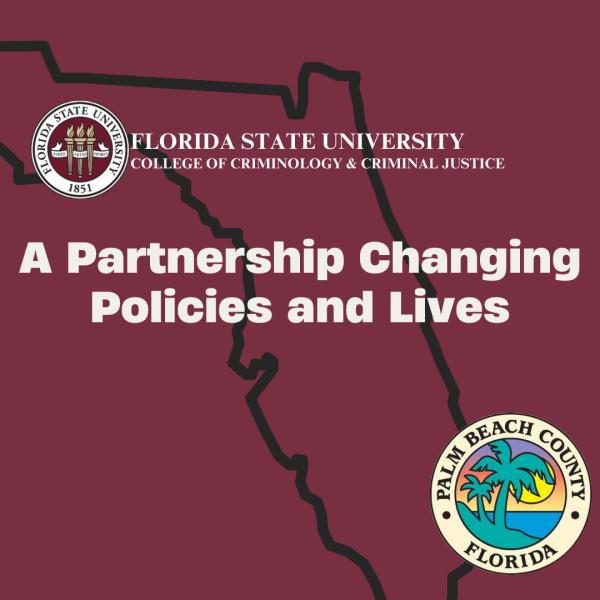
The mission of Florida State University’s College of Criminology & Criminal Justice is to serve the public with research that translates directly into effective policy.
The mandate is emblazoned on the College’s crest: “Bringing research to life,” and evidence of its reach is found in each of the state’s 67 counties; but none more so than Palm Beach.
A relationship sparked by an out-of-the-blue phone call to Dean Tom Blomberg in1993 has grown into a robust research pipeline through which more than 20 different projects and millions of dollars in grants have flowed. A memorandum of understanding between the county and the College signed in 2021established FSU as the county’s go-to research partner.
Nicole Bishop, the director of Victims Services and Justice Services in Palm Beach County, said the county’s work with the College resonates throughout daily life there.
“We’ve taken the work that FSU has done here and used it to make lasting policy changes that have improved how we serve the people of this county,” Bishop said. “They have been great to work with. They listen and so do we. It’s a true partnership.”
For his part, Blomberg said it is not a partnership he could have predicted.
“In the summer of 1993, Diana Cunningham, the executive director of the Palm Beach County Criminal Justice Commission, reached out to me to request that I meet with her and her staff to consider a research and policy collaboration. They received a National Institute of Justice grant to examine high-crime and distressed neighborhoods.”
Blomberg was initially concerned about feasibility but credited the now-retired Cunningham with effective facilitation in driving the partnership early on: “I was reluctant because Palm Beach County is over 400 miles away, but Diana was determined.”
That initial project has evolved into a series of research projects —and policy wins— between the College and FSU. That work includes examining health care expenditures in the county jail, which led to a 33 percent reduction in costs for inmate care and improvements in health outcomes.
Violence reduction studies, police training, juvenile justice, domestic-violence homicide prevention programs, and an examination of family drug courts are just a handful of the areas FSU has researched in Palm Beach County.
With funding from the U.S. Department of Justice, Office for Victims of Crime, FSU researchers studied victim advocacy policies in notification of families of traffic fatalities. That study sparked the practice of victim’s advocates accompanying police in notifying families and in helping steer families through the process of losing a loved one.
Bishop said the use of victims’ advocates is an overwhelming success.
“That’s a difficult situation and this is something that makes it better for everyone involved,” she said. “Advocates are used by law enforcement all around the country now. It started here.”

Success in Palm Beach has fueled relationships with more counties, the Florida legislature and —outside of Florida— a host of federal and state agencies. Those relationships in turn, yield the opportunity for more translational research and resulting evidence-informed criminal justice policies.
Success includes saving Florida taxpayers hundreds of millions of dollars in up-front costs and ongoing expenses, as was the case in Broward County where FSU researchers found proposed new jails were not necessary.
“They were ready to launch a major bond initiative to generate millions of dollars for building four new jails,” Blomberg said. “We found they didn’t need to do that.”
In Duval County, FSU researchers drew from crime data to identify patterns and forecast the trends and needs of future crime victims. Their work drove the development of the Jacksonville Victim’s Service Center. Thanks to its evidence-informed approach to tailoring resources to the unique needs of the community, the center has become an internationally recognized model of on-site, comprehensive victim services in a one-stop-shop, earning plaudits from the National Organization of Victims Assistance and the U.S. Department of Justice, Office for Victims of Crime.
The College’s statewide reach notwithstanding, Bishop said Palm Beach County’s blend of racial, ethnic and socioeconomic diversity ensures that it will continue to serve as an ideal laboratory for translational research.
Associate Professor Jennifer Copp agrees.
Copp’s work in Palm Beach began in 2015 and her research includes a focus on pretrial processes to identify strategies promoting safe and equitable reductions in jail populations. Copp has conducted numerous studies in Palm Beach County, a grant from the National Institute of Justice to investigate existing pretrial practices is the most recent example.
That work includes exploring empirical strategies to pretrial release that maximize court efficiency and public safety, in addition to in-depth interviews with individuals with lived experience to understand the social and economic tolls associated with pretrial practices.
“Depending on the findings,” Copp said, “it could help pinpoint practices that relieve pressure on the jail, improve individuals’ outcomes, and reduce racial and ethnic disparities.”
As the relationship with Palm Beach County enters its 34th year, Blomberg said the College is forever changed.
“Palm Beach County —and our success there— has permeated our curricula. It is not just our graduate students; it is our undergraduates,” he said. “And that translational focus is resonating throughout.”
Blomberg added: “It is part of who we are.”
